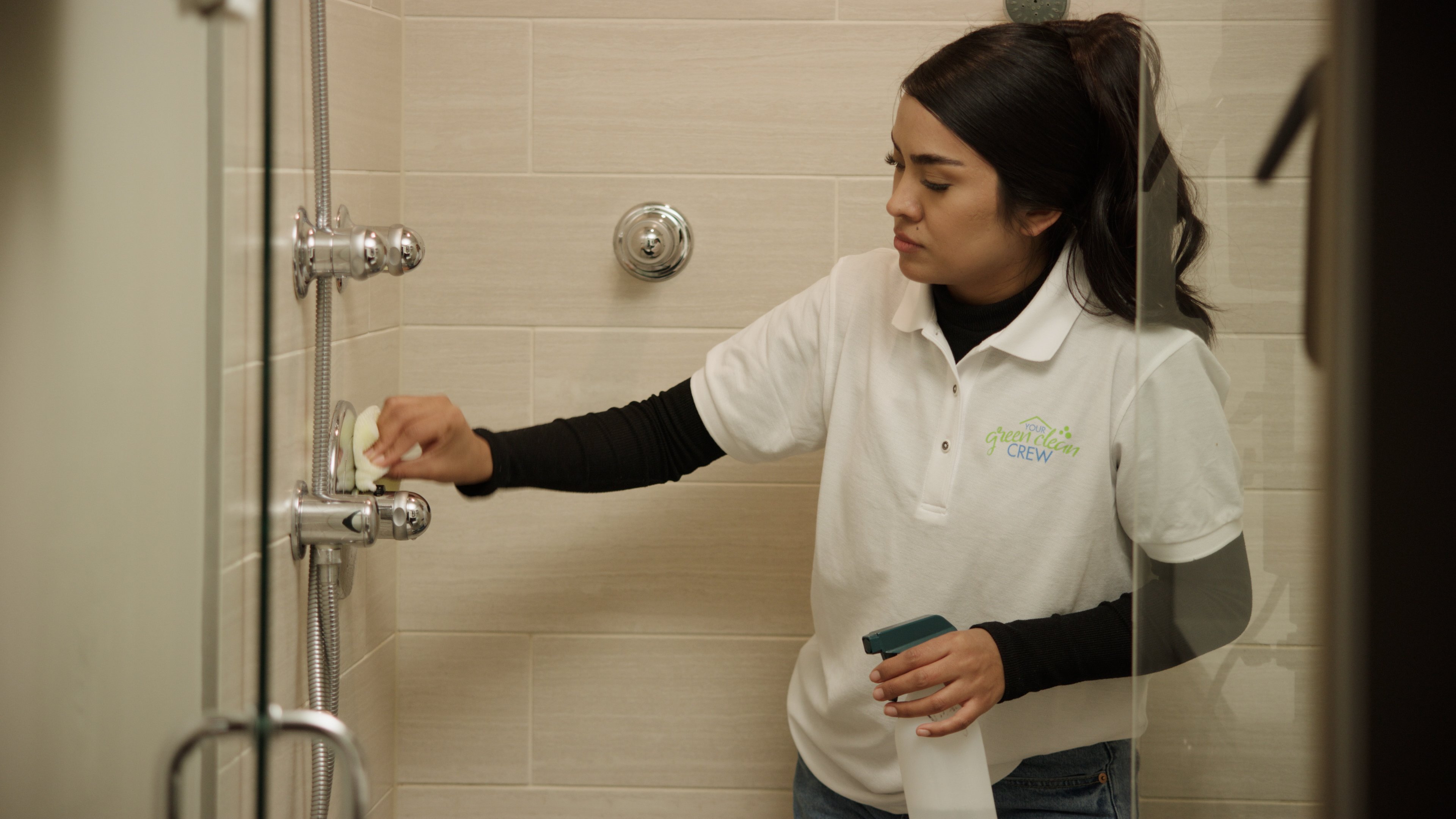
Clean walls are an important part of a well-kept house. Use this wall cleaning cost guide to see what it would cost to hire a professional to get the job done.
Getting rid of hard water stains doesn’t need to be hard


Hard water stains can affect different parts of your house in different ways—none of them good. Thankfully, you can learn how to remove hard water stains using household products you have lying around. Read on to find out how to get rid of these stains and keep them gone.
Your home has hard water if the water flowing into your house has large amounts of dissolved calcium and magnesium. Different parts of the country are more prone to high water. For example, western Texas, Utah, and New Mexico have very hard water. States like Nevada, Oklahoma, and Ohio are also known for their hard water.
Hard water stains tend to look like rusty or white, chalk-like deposits, commonly known as limescale, on your dishes, sinks, showers, and toilets. If you’re constantly scrubbing these away, you can be fairly confident that you’re dealing with hard water spots.
Other signs of hard water include:
Cloudy water
Residue on your hands after washing them
Needing more soap or detergent to get things clean
Limescale in your dishwasher
Once you’ve nailed down your potential hard water problem, you can consult a local water softening company to test your water and discuss potential solutions.
Hard water stains can be a nuisance. Fortunately, getting rid of them doesn’t have to be. Let’s cover a few methods on how to remove hard water stains in your home.
By itself, vinegar does a good job of removing light stains. However, when you pair it with baking soda, this duo packs a punch. Cleaning with vinegar and baking soda works great on hard water stains around your home, like shower walls, glass doors, and toilet bowls.
Fill a spray bottle with vinegar, and spray the water stains. Let it sit for 30 minutes, and rinse with water.
Make a paste with 2 parts baking soda and 1 part water in a bowl or bucket.
Apply the paste to the water stains with a brush, and let it sit for 30 minutes.
Rinse off the walls with water. If you’re having a hard time removing the paste, use a little vinegar.
To clean glass shower doors, spritz them with vinegar and wipe them down with a microfiber cloth.
For stubborn stains, mix 2 parts baking soda with 1 part water to make a paste and scrub it into the stain.
Let it sit for about 30 minutes before wiping it clean with a vinegar-soaked cloth.
Use gloves to protect your hands.
Flush your toilet.
Pour in 2 cups of vinegar around your toilet bowl.
Mix the vinegar in the water and swirl it with a toilet brush.
Let it sit for five minutes.
Pour in 1 cup of baking soda, then 2 cups of vinegar on top of it.
Let it sit for 10 to 20 minutes.
Use your toilet brush to scrub the stains, then let it sit for another 20 to 30 minutes.
Scrub the stains, flush, and repeat as needed.

Sometimes, spraying vinegar on a surface isn’t always enough since it can dry out before it’s finished breaking down the stains. That’s where vinegar-soaked paper towels come in handy as the first step. This method of getting rid of hard water stains works for cleaning kitchen sinks and underneath toilet bowl rims.
For a sink or vanity, soak a paper towel in vinegar and lay it over the stain.
Let the vinegar sit for 30 minutes before rinsing with water.
Mix 2 parts baking soda and 1 part water in a bowl or bucket to make a paste.
Use a brush to work the paste into the surface.
Let it sit for at least 30 minutes to work its magic.
Use a microfiber cloth or paper towels to remove the paste.
Spritz vinegar to help remove dried baking soda residue.
Put on protective gloves.
Flush the toilet.
Saturate a paper towel with vinegar, then press it into the underside of the toilet bowl rim.
Let it sit for 20 minutes.
Remove it, and use your toilet brush to loosen and remove the stains.
If the stains persist, put baking soda on a damp sponge.
Apply more vinegar and scrub that area with your sponge.
Leave the mixture for 10 to 20 minutes, then scrub some more.
Repeat as needed.
Flush the toilet once the stains are gone.
Your teeth aren’t the only thing that fluoride toothpaste can clean. Your toothpaste is a mild abrasive that can be effective on small areas like fixtures and dishes. You can still use it on larger areas, but you’ll need a lot to cover the stains. Also worth noting is that you should stick with regular toothpaste and not gel.
Apply a small amount of toothpaste to cover the stain.
Use a damp microfiber cloth to rub it in.
Let it sit for five minutes.
Rinse and dry the area to see if the stain is gone.
Repeat and use an old toothbrush for extra pressure, being careful not to scratch your surface, as needed.
Hydrogen peroxide is a great mild household cleaning and disinfectant product. You can use it to break down hard water stains on shower doors, fixtures, glass, tiles, and toilet bowls. Make sure to leave it in its dark brown bottle because it can start to decompose when exposed to light.
Spray hydrogen peroxide on the affected surface.
Let the household product sit for 30 minutes.
Use a soft-bristled brush (or toilet brush for toilet bowls) to remove the stains gently.
Repeat these steps as needed.
Both lemon juice and vinegar are acidic, making this pair effective. Alone, they can remove regular hard water stains, but using them together can increase their effectiveness. However, you shouldn’t use this solution in some areas because it can potentially damage them, like hardwood and natural stone flooring.
Combine 1 part lemon juice and 1 part vinegar in a spray bottle.
Thoroughly spray the solution on the stains.
Let it sit for 10 minutes.
Use a microfiber cloth to scrub the stain gently.
Use a soft sponge or bristle brush for extra pressure if it's still there.
Rinse off the solution with cold water.
Repeat the steps as needed.

Once you learn how to remove hard water stains, the next step is to keep them gone. Preventing them takes a bit of elbow grease, but it’s worth it. Here are some tips you can try to say goodbye to hard water stains.
Chrome faucets and shower walls are prone to hard water marks, but wiping everything down post-shower will go a long way toward preventing stains. Keep a squeegee nearby and use it on your way out of the shower. You can also use your bath towel to dry the shower walls and head. This task only takes a minute, but it will help prevent mineral buildup that takes longer to clean later.
Splashes happen, but they will leave minerals behind when they’re left to dry on their own. That will lead to discoloration on your tile floors and vanities. A better way is to prevent tile stains by wiping up little puddles when they appear. Keep your bathroom sink clean and glistening white by wiping it dry after use, too.
Get ahead of stains with regular cleaning. Spritzing shower walls, vanities, sinks, and toilet bowls with vinegar can help eliminate hard water stains before you even notice them. Keep a spray bottle of vinegar in the bathroom. It’ll come in handy for removing water stains and other game-changing bathroom cleaning hacks.
A water softener is an in-home filtration system. As water flows through the salt in the appliance, it pulls out calcium and magnesium. Then, the water proceeds through your home’s plumbing system as usual.
Not only does this help prevent water stains, but it also prevents your clothes from feeling stiff when they come out of the wash, keeps minerals from building up in the pipes (also called pipe scale), and reduces mineral spots on your glassware.
Removing hard water stains isn’t a difficult job, but it requires some time and scrubbing. A local house cleaning company can easily handle the job for you, along with many of your other cleaning tasks. When booking your house cleaning service, make the pros aware that you have hard water and want to avoid staining. House cleaning costs $170 on average.
They were very kind, polite and clean. Did a great job
The provider along with 3 staff arrived within agreed timeframe and immediately began work. They requested to use my personal vacuum cleaner, which surprised me. They preferred that to using there own so as not to transfer undesired items (such as bedbugs) from one house to another. Kelly...
Incredibly low auto rates! I had been a customer with Allstate for decades. Never filed an auto claim, never had an accident, never had a speeding ticket. Allstate agent told me year after year that I was receiving 'premier customer' rates, so I was apprehensive to change. Bought a house,...
Got a ballpark price from Joe the owner - about $400 for parts and labor - about what I expected. Joe (owner) continued to call me for several days asking to install the gas line, trying to close the deal. Federal tax refund check arrived, gas appliances bought, ready for install. Called...
The job went very good overall. The estimate went great, they gave me a fair price and showed up on time. They were very professional in all aspects of the job from the estimate to the end. They cleaned up at the end of each day and at the end of the job. They ensured that all that I asked...
From average costs to expert advice, get all the answers you need to get your job done.

Clean walls are an important part of a well-kept house. Use this wall cleaning cost guide to see what it would cost to hire a professional to get the job done.

Ammonia for household use can help do everything from making the toughest chores a breeze to repelling pests of all sizes to even feeding your houseplants. Find out some of the best, most surprising ways to use ammonia around the house.

Cleaning your house can be a feat, but these house cleaning tips can help you make the most of your cleaning without taking up all of your time.

Get organized with a checklist that walks you through how to prepare your home for the holidays—it’s the perfect way to make sure nothing is forgotten.

Not sure if you can use carpet cleaner on your couch? Learn how to safely clean your couch using carpet cleaner with this informative guide.

Keeping your home clean is good for you and your house. Learn what deep cleaning is and how it differs from regular cleaning before you whip out the sponges.